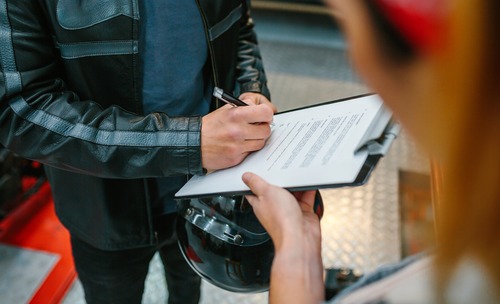Determining liability in motorcycle crashes is a complex but crucial process for ensuring justice and fair compensation for victims. With the state’s strict contributory negligence rule, even a small degree of fault can bar recovery, making it essential to thoroughly investigate the accident and present compelling evidence. Understanding how fault is assessed, the role of evidence, and the importance of legal representation can make a significant difference in the outcome of a claim.
In this blog, we explore the key factors in determining liability in motorcycle crashes and highlight the importance of working with an experienced motorcycle accident attorney in Asheville to secure fair compensation.
Understanding Liability in Motorcycle Crashes
Determining liability in motorcycle crashes is a crucial step in ensuring fair compensation and accountability for the damages and injuries sustained.
What is Liability?
Liability refers to the legal responsibility of a party for causing harm or damage in an accident. In the context of motorcycle crashes, liability identifies who is at fault and determines who is financially responsible for compensating the injured party. Establishing liability is the cornerstone of any personal injury claim, as it defines the foundation for seeking damages.
The Legal Standard: Negligence
Negligence is the legal framework used to establish fault in most motorcycle crash cases. To prove negligence, four key elements must be demonstrated:
- Duty of Care: The responsible party owed a duty to act in a reasonable and safe manner.
- Breach of Duty: The responsible party failed to fulfill this duty.
- Causation: The breach directly caused the accident.
- Damages: The injured party suffered measurable losses as a result.
Evidence such as traffic laws, accident reports, and witness statements is critical in proving these elements and establishing fault.
The Role of Evidence in Liability
Evidence is the backbone of determining liability in motorcycle crashes. Police reports provide an unbiased account of the crash, while witness testimonies add firsthand insights. Additional evidence, such as photographs of the scene, vehicle damage, and skid marks, helps reconstruct the accident’s events. In some cases, expert testimony can provide specialized knowledge, strengthening the case by offering professional analysis of technical details.
Factors Influencing Liability in Motorcycle Crashes
Liability in motorcycle crashes is shaped by various factors, including legal doctrines, driver behavior, and external conditions, all of which play a significant role in determining fault and accountability.
Contributory Negligence Rule
North Carolina adheres to the contributory negligence rule, one of the strictest legal standards in the country. Under this rule, if a motorcyclist is found even minimally at fault for the accident, they may be barred from recovering any compensation. This makes proving complete fault by the other party critical in motorcycle crash cases. For example, actions such as speeding or failing to signal can result in a contributory negligence claim, even if the other party’s actions were primarily responsible for the crash.
Driver and Motorcyclist Behavior
The behavior of both the motorcyclist and other drivers on the road significantly impacts liability determination. Drivers may be at fault for actions like speeding, distracted driving, or failing to yield the right of way. On the other hand, motorcyclists face scrutiny for lane-splitting, sudden weaving through traffic, or riding on the shoulder. While not all these behaviors are illegal, they can influence perceptions of responsibility and contribute to liability disputes.
Road and Environmental Conditions
External factors such as poor road maintenance, inadequate signage, and adverse weather conditions can also influence liability. In some cases, government entities may be held accountable if hazardous road conditions contributed to the accident. For example, a pothole causing a motorcyclist to lose control might shift liability to the municipality responsible for maintaining the road.
Mechanical Failures and Defective Parts
Mechanical failures, such as brake malfunctions or tire blowouts, can also play a role in determining liability. If a defective motorcycle part caused or contributed to the accident, manufacturers and distributors might be held accountable. Proving such claims typically requires expert analysis to link the defect directly to the crash.
Traffic Violations as Evidence of Fault
Traffic violations committed by any party involved in the accident serve as compelling evidence of fault. Actions like running red lights, failing to stop at a stop sign, or violating speed limits breach the duty of care and strongly indicate negligence. Documenting these violations is essential for building a strong liability case.
Key Evidence in Establishing Fault
Proving fault requires gathering and presenting compelling evidence to establish liability in motorcycle crash cases.
Police Reports
A police report is one of the most valuable sources of evidence in a motorcycle crash case. It provides an official account of the incident, including details about the accident scene, involved parties, road conditions, and any traffic violations. Police officers may also include their observations, photographs, and witness statements, all of which contribute to forming a clear picture of the crash. This document serves as a foundational piece of evidence that lawyers and insurance companies rely on during the claims process.
Witness Testimonies
Eyewitness accounts offer critical firsthand insights into how the accident occurred. Witnesses can describe the actions of the involved parties, such as sudden maneuvers, reckless behavior, or traffic violations, that may have contributed to the crash. Their testimony helps corroborate evidence and provides a neutral perspective that can strengthen a liability claim.
Photographs and Video Evidence
Visual documentation of the accident scene is essential in reconstructing the events leading to the crash. Photographs and videos of vehicle damage, skid marks, traffic signals, and weather conditions provide concrete, irrefutable evidence. In some cases, dashcam or surveillance footage can capture the exact moment of the accident, offering critical insights into fault.
Medical Records and Injury Documentation
Medical records serve as evidence of the injuries sustained in the accident and their direct link to the crash. These records help establish causation, showing how the negligence of the at-fault party resulted in physical harm. Detailed documentation of medical treatments, diagnoses, and recovery timelines strengthens the claim for damages.
Expert Testimony and Accident Reconstruction
Experts play a vital role in providing professional analysis to establish fault. Accident reconstruction specialists analyze evidence like vehicle positions, impact points, and skid marks to determine how the crash occurred. Similarly, medical experts can explain the nature and extent of injuries, connecting them directly to the accident. These expert opinions add credibility and depth to the evidence presented.
The Role of Legal Representation
Legal representation is essential in navigating the complexities of liability determination and securing fair compensation in motorcycle crash cases.
Understanding Legal Processes and Requirements
An experienced attorney provides crucial guidance through the legal processes involved in a motorcycle crash claim. They ensure that all procedural requirements, such as filing deadlines and documentation, are met. Attorneys understand the intricacies of contributory negligence laws in North Carolina and how to counter claims that could bar compensation. Their expertise ensures that the injured party’s rights are protected throughout the process.
Evidence Collection and Case Building
A lawyer plays a pivotal role in gathering and organizing evidence to establish fault. From obtaining police reports and witness statements to coordinating with accident reconstruction experts, an attorney ensures that all necessary evidence is collected and presented effectively. This comprehensive approach strengthens the case and increases the likelihood of a favorable outcome.
Negotiating with Insurance Companies
Insurance companies often aim to minimize payouts, which can leave accident victims with insufficient compensation. Attorneys act as advocates during negotiations, countering low settlement offers with compelling evidence and legal arguments. Their expertise helps level the playing field, ensuring that accident victims receive fair compensation for medical expenses, lost wages, and other damages.
Litigation and Trial Advocacy
If negotiations fail to result in a fair settlement, legal representation becomes even more critical during litigation. A skilled attorney presents the case in court, cross-examines witnesses, and leverages legal expertise to advocate effectively for their client. Their ability to navigate the courtroom ensures that the injured party’s case is presented in the strongest possible light.
Providing Peace of Mind
Navigating the aftermath of a motorcycle crash can be overwhelming, especially when dealing with severe injuries and financial losses. Legal representation allows victims to focus on recovery while their attorney handles the complexities of the claim. This support provides peace of mind and ensures that the case is managed professionally and efficiently.
Consult With an Experienced Asheville Motorcycle Accident Lawyer!
If you or a loved one has been involved in a motorcycle crash in North Carolina, understanding your rights and navigating the legal process can be overwhelming. Let our experienced team at NC Car Accident Lawyers provide the support you need to pursue justice and fair compensation. We are dedicated to helping you gather the necessary evidence, negotiate with insurance companies, and, if needed, represent you in court to achieve the best possible outcome.
Contact us at 864-561-6247 for a free case review today!





